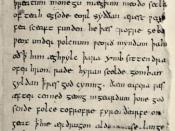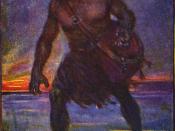BEOWULF: CHRISTIANITY AND PAGANISM Beowulf was a story that was originally told in the eleventh century. It clearly reflects the changes in beliefs that had taken place a short time before. It combines both Christian influences along with the old pagan ways that dominated before Christianity started taking hold in the late seventh century.
There are several signs of paganism in the story. Two of the most evident signs are the fact that there is a monster (Grendel) and a hero (Beowulf) that steps into save the people that were being terrorized by Grendel.
Grendel was an evil monster who tortured people with his powerful strength. He had enormous claws which he would use to slaughter people. He was feared by all the Danes because of his great power, and considered unbeatable by any man. Beowulf was a hero to the Danes. He endangered himself to help protect the Danes.
He was considered superhuman because of his abilities to defeat anyone in a battle. He was the protector of the danes; he was their god.
Intertwined with all the Paganism, were many Christian references. There was a struggle between good and evil. Grendel was said to be a descendent of Cain. And, in the end there was a final battle between good and evil.
One Christian influence was the portrayal of good verses evil. Grendel was evil. He was jealous of all the joy of the people, just as Satan was jealous of mankind on earth. He would terrorized the people and kill them for no reason at all. He became Beowulf's adversary just like Satan became the adversary of God. Beowulf was strong and the protector of the Danes like God was the protector of mankind.
Another Christian influence in the story of...


